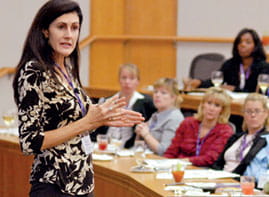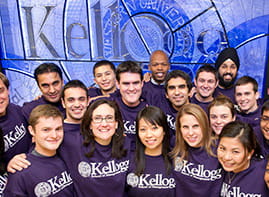Turnaround expert who dared to be a ‘game-changer’ offers ‘contrarian’ insights during student-led program that showcases school’s global perspectives
2/13/2008 - For a guy who claims he can’t even boil water, Selim Bassoul ’81 has kept things cooking at his company.
As CEO of Elgin, Ill.-based Middleby, a commercial food service equipment manufacturer, Bassoul and his team have attracted widespread praise since a turnaround effort in 2001 rescued the firm from near bankruptcy. Since then, Middleby has fought back to garner heaps of critical praise and land on Fortune’s 100 Fastest-Growing Companies and in the top 10 of Forbes’ Top 200 Best Small Companies.
The results are less surprising given the leadership behind Middleby’s rebirth.
“I wanted to have an impact, to be a game-changer,” Bassoul told a capacity audience of Kellogg School students during a visit Feb. 11 as part of the MOSAIC initiative, two weeks of lectures and events that celebrate the strength of the school’s diverse global community. Bassoul, a self-described lifelong “contrarian,” said he turned down lucrative opportunities at leading consumer goods firms for a chance to take “a less traveled path” as an entrepreneur at a company where he could make a difference. And so he has.
The Lebanon native quadrupled Middleby’s sales and growth since becoming CEO in 2000, while pushing into new markets like China and India. The company’s stock was floundering around $5 a share in 2001; by early 2007 it hit $144 before splitting in June. Revenue in 2007 was $453 million, with $156 million in gross profits. By comparison, in 1998 the company lost $4 million on $132 million in sales. The following year Bassoul said the firm’s dismal customer retention rate was less than 50 percent — small wonder, when about a third of all Middleby orders were delivered late. The company took a number of steps to right itself, beginning with refocusing on what it does best: producing commercial kitchen equipment, most notably food warming gear.
Today the company has some 1,300 full-time employees in17 offices worldwide and manufacturing facilities that produce nearly two dozen respected brands, including Middleby Marshall conveyor ovens, Blodgett ranges, steamers and convection and pizza ovens, and Pitco fryers. Investment in customer service and superior technology has paid dividends, said Bassoul, 51, who is also Middleby’s president and chairman.
“We’re very patent-driven on technology. … We’re number one or number two in every segment we serve,” he said. “We did this in 10 years.”
The accomplishment was predicated on business model refinement, including a reduction in SKUs, eliminating some $20 million in sales that resulted from an effort to exit less profitable businesses (such as sink sanitizers, mixers and cold and hot display cases) deemed outside Middleby’s new focus. The company also took another look at its customers, diversifying its base to target major restaurant buyers like Olive Garden, Subway and Red Lobster, while shedding marquee names like Wolfgang Puck when the return failed to merit the efforts needed to retain those clients. Other strategic moves during Bassoul’s early tenure include improving employee morale and making innovation a priority throughout the company by hiring top engineering specialists in combustion and heat retention, paying attention to issues of energy conservation — even while Americans were still driving Hummers.
“We bet on energy efficient ovens” when it seemed few in his industry were paying attention to the benefits of greener technology, Bassoul said.
At the same time Middleby began positioning itself as a global brand, seeing an opportunity to become a worldwide player in a segmented arena that saw Italian manufacturers dominating Europe and Japanese suppliers serving Asia. Bassoul noted that his company has successfully entered markets such as India with innovations that include specialized samosa fryers whose technology aims to improve taste, streamline labor and minimize cost by reducing waste of pricy commodities, such as cooking oil. Similarly, Middleby has introduced a ceramic tandoori oven with a titanium lining that is “highly patented,” according to the Kellogg graduate.
But how to defend those patents in a global marketplace where intellectual property rights are not universally respected, and abuses not always prosecuted?
Bassoul believes the Middleby brand “protects itself,” in part because of the quality of the firm’s products, but also because of the company’s customer service guarantees, such as the “no quibble” warranty Bassoul started in 1999. “This was a huge expense, and we got a lot of returns in the fall,” he recalled, adding that some caterers would use the products all summer and then ship them back to the company for a refund in September or October. But rather than overreact and rescind the warranty altogether, risking losing a tool that could garner competitive advantage, Middleby figured out the loophole and fixed it.
“We stopped selling to the problem customers,” Bassoul said. “You don’t penalize 90 percent of your customers for 10 percent of abuses.” Today he says he spends about a third of his time interacting with people who don’t buy his products, since these are the ones who can provide the company with valuable information about how to expand its market.
It’s these strategic insights that have resulted in Bassoul being inducted into the Entrepreneurship Hall of Fame in 2006 and earning the 2005 Ernst & Young Entrepreneur of the Year Award. He also was named a finalist in the 2005 American Business Awards’ “Best Turnaround Executive” category. In 2007, the online investment adviser Motley Fool named him “Best CEO.” Bassoul takes this all in stride. If you are willing to be transparent, ethical, demonstrate a passion for business and can explain your business, he told students, “people will reward you.”
During his lecture, Bassoul advised Kellogg students to consider the kind of company — and career — they want. “It doesn’t have to be Coke, Pepsi,” he said. “You can have a big impact at other firms, smaller firms.” Before becoming CEO, Bassoul had been with Middleby since 1996 when he was president of the Southbend division prior to becoming chief operating officer in 1999. Earlier, the Kellogg finance major had spent eight years at American Hospital Supply and Baxter Inc.
But clearly his passion has brought him to the right place today.
“You put me against [GE CEO] Jeff Immelt and I will kick his butt!” said Bassoul, with a laugh that nevertheless did little to diminish his underlying faith in the contention. “This is my business. Nobody can attack us the way we are. … We are nimble, we are smart and we know our business.” Today, Bassoul says the company is pioneering ventless oven technology and exploring sophisticated voice-activation kitchen equipment. As the Kellogg alum told Kiplinger’s in a laudatory January 2007 interview “If you are not on top of the trends, you will never survive. ”
In introducing Bassoul, Kellogg School
Dean Dipak C. Jain praised his “unique leadership style” that strives to keep customers and employees happy. Jain also congratulated members of the
Kellogg Student Association who have led the MOSAIC effort, an initiative he said highlighted the school’s global perspectives, one of the four guiding principles that inform the Kellogg curriculum and culture.
By celebrating the global diversity of the Kellogg student body, said Jain, MOSAIC reinforces the school’s commitment to leadership that “takes account of multiple perspectives to solve problems.” Such an approach, said the dean, is critical in today’s marketplace.
“Diversity makes a country and a company great,” said Jain. “Business schools must attract and shape that diverse talent.”






